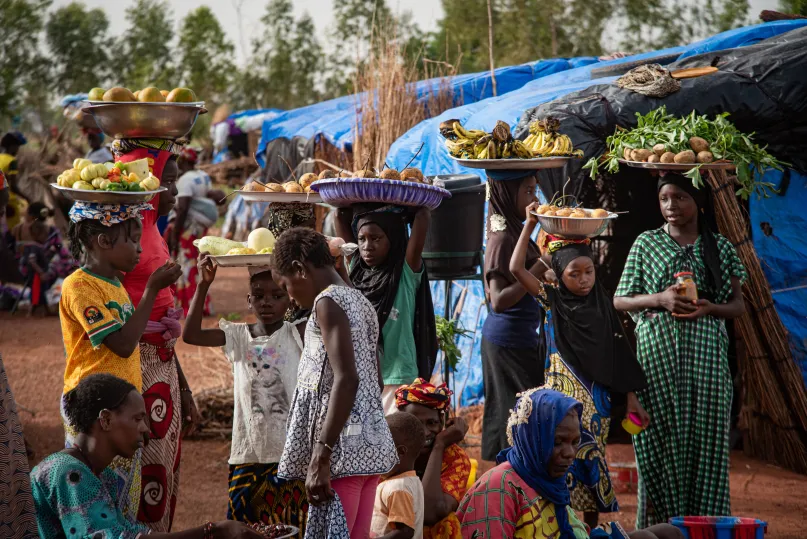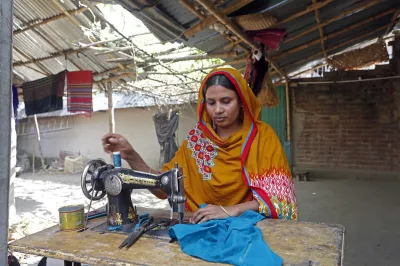The Business Case for Investing in Women in Agriculture

Women represent nearly half of the global agricultural labor force. Yet, their access to crucial finance and business development opportunities remains far below that of their male counterparts. Additional barriers to their economic, social, and political participation further heighten the challenges they face.
While this this is indeed a challenge, there is reason for optimism. Efforts to close the gender finance gap in agriculture are yielding impressive results for women, businesses, and the larger societies and agri-food systems in which they operate. Through a combination of financial and technical support, these efforts are continuing to prove that there is an undeniable business case for investing in women. The 2023 Cracking the Nut conference and resulting publication explores key evidence generated by Mennonite Economic Development Associates (MEDA) and Root Capital.
The wide-reaching benefits of extending loans to women
Root Capital began its Women in Agriculture Initiative (WAI) in 2012 with the aim of promoting gender equity and inclusion for women in the sector. Since then, 1,220 loans to 550 borrowers have been reviewed to measure the impact of loans extended to women-led and gender-inclusive enterprises – (where women make up more than 30% of an enterprise’s suppliers and employees). The results present a clear business case for investing in women, with women-led businesses consistently outperforming those not led by women. Loans to women-led enterprises were found to yield an average of USD17,850 more in annual profits than those led by men, after controlling for loan size, region, and industry. Their average default rate was 4.12% lower than men. They also showed greater stability, with variations in year-over-year revenues that were one-third smaller than their counterparts.

There are also significant industry and society-wide benefits to investing in women in agriculture. In 2019, Root Capital extended a loan of USD150,000 to Rebuild Women’s Hope (RWH), a coffee cooperative in the eastern Democratic Republic of the Congo (DRC). RWH provides women in the region with the resources they need to become financially independent in the traditionally male-dominated coffee sector. With the lending and advisory services received from Root Capital, RWH has flourished. The cooperative has expanded its market globally and is now providing coffee to buyers in North America, Europe, and Asia. Beyond its market growth success, RWH has also made a strong impact on shifting norms around women working in the coffee sector in the DRC and has established an affordable maternity center to provide holistic support and resources to women working in the sector.
Toward gender-transformative enterprises
Supporting organizations to reach a stage where they are considered gender-inclusive has been a focus area of MEDA’s efforts to transform agri-food systems globally. Since 2017, MEDA has leveraged it's Gender Equality Mainstreaming (GEM) framework to conduct assessments and create action plans that integrate gender into all dimensions of enterprise models – moving them along a spectrum from a state of gender blind to gender transformative. This includes supporting organizations to develop gender-sensitive policies, conduct targeted recruitment for women, and create product and marketing strategies that focus on women’s needs.
To date, 30 firms and seven investment funds have applied the GEM framework to their business models, including those focused on agriculture. An assessment in 2023 showed that 90% of respondents had implemented over half of the recommendations identified in their GEM reports. When firms scored higher on GEM, they also showed higher profitability, productivity, employee retention, risk management capabilities, and market share. As was the case for Root Capital, when investments were made alongside technical assistance to mainstream gender, there was greater success than from investments alone. These project-linked investments outperformed investment-only projects on women’s job growth by a factor of 10.

In Indonesia, Macrosentra Niagaboga (MN) distributes food products including dairy and soy across the country. Through support from USAID, MEDA awarded MN with USD 40,000 to implement the GEM framework. One of their initiatives was the development of an employee diversity performance management system. Sex-disaggregated data in the system revealed that women were outperforming men across the entire enterprise. MN was then able to use this data to set initial targets that will increase its total workforce from 22% women staff to 35% over the next two years and to design a mentorship program for women employees. These actions will support the improved business performance of MN and an increase in women’s job growth and decision-making authority.
Moving the needle forward for women in agriculture
Both MEDA and Root Capital’s evidence demonstrates the strong business case for investing in and providing business support to women across the agricultural value chain to create more resilient and successful enterprises. To realize these findings, however, will require collaboration and partnerships in the agri-food system to tackle gender norms and inequalities that are setting women back. We simply cannot afford to continue excluding this critical half of the agricultural workforce.


